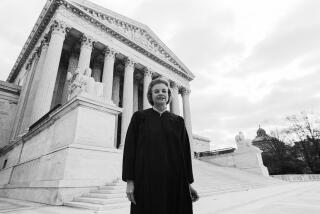Comparing Roe, Dred Scott Decisions Angers Senator
- Share via
WASHINGTON — The Senate’s only black interrupted the questioning of Judge Ruth Bader Ginsburg Thursday to say that she found it “personally offensive” when a Republican colleague compared the Roe vs. Wade ruling on abortion to the infamous Dred Scott decision of 1857 that sanctioned slavery.
“I find it very difficult to sit here as the only descendant of a slave (and listen to a senator) analogize Dred Scott and Roe vs. Wade,” said Sen. Carol Moseley-Braun (D-Ill.).
She spoke after Sen. Orrin G. Hatch (R-Utah) denounced “judicial activism” by the Supreme Court, past and present. Hatch apologized but said that Moseley-Braun has missed his point.
The Dred Scott decision was “the all-time worst case in the history of this country,” Hatch said.
Faced with the question of whether a white slave owner could regain possession of a black man named Dred Scott who had lived freely in a Northern state, the Supreme Court in 1857 announced a broad property right for slave owners, one that could be not be infringed upon by laws that abolished slavery in some states. The ruling declared unconstitutional the “Missouri Compromise” because it created “free states” where slavery was illegal.
It took the Civil War and the enactment of the 14th Amendment in 1868 to overturn the decision.
According to Hatch, the court erred in 1857 when it created a broad property right for slave owners, just as it erred in the 1973 Roe case when it created a broad “right to privacy” which included abortion. Both rights were “created out of thin air,” he said.
“In my view, it’s impossible as a matter of principle to distinguish Dred Scott vs. Sanford . . . and privacy cases like Roe vs. Wade,” Hatch told Ginsburg. “The methodology is the same. The only difference is the results, which hinge on the personal, subjective values of the judge.”
Ginsburg, who sat quietly through the exchange, had a swift rebuttal.
“In one case, the court was affirming the right of one man to hold another in bondage,” she said. “In the other line of cases, the court is affirming the right of the individual to be free. So I do see that there’s a sharp distinction there.”
More to Read
Get the L.A. Times Politics newsletter
Deeply reported insights into legislation, politics and policy from Sacramento, Washington and beyond. In your inbox twice per week.
You may occasionally receive promotional content from the Los Angeles Times.











